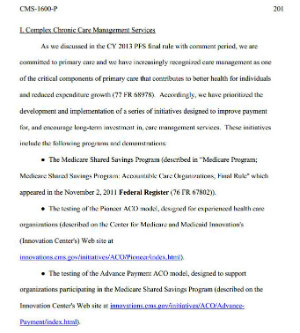 I have a confession to make: Despite painful experience, I am a serial optimist. Over the past several years, I have gotten very excited about new benefits added to the Medicare program as ways to support high-quality geriatric care.
I have a confession to make: Despite painful experience, I am a serial optimist. Over the past several years, I have gotten very excited about new benefits added to the Medicare program as ways to support high-quality geriatric care.
Now, a new Complex Chronic Care Management Services benefit has been proposed by the Centers for Medicare and Medicaid Services (CMS). It would address the long-standing concerns that good care to chronically ill older people is discouraged by the focus in the Medicare payment system on face-to-face patient interaction without adequate support for planning, communicating with other providers, and other services outside the exam room.
It could be a really good thing, but it also has many seemingly arbitrary or unclear features. That’s where all of us who work in this field come in. CMS is seeking comments from the public on the new rule.
Even though the website regulations.gov says the deadline to submit comments is Friday, July 19, we've learned that the actual deadline to offer suggestions for improvement is Friday, Sept. 6. But with summer flying by, it will be here before you know it. So don't delay.
I feel my hopes rising over this new benefit, but I have been let down before.
In New for 2011, I gushed about the new Annual Wellness Visit as a benefit that could be the foundation for geriatric care through patient-centered assessment and planning. Only to be disappointed, first by the removal of the "advanced care planning" provision that would have supported improved end-of-life care, and then by the low rate (~9 percent) of use of the benefit owing to its complexity and many unknowns.
More recently, in New Medicare Codes: I Want to Believe, I was excited about the new fee-for-service Care Transition Management benefit (Codes 99495 and 99496). Somewhat more cautious now, I worried about how feasible the benefit would actually be and if it would actually work to improve care and reduce hospital readmissions. My skepticism increased when I recently learned that this benefit was introduced without input from the Medicare Payment Advisory Commission (MedPAC) and I have yet to find any expert in the field who will confess to advising the design of the benefit.
So why am I optimistic about this latest proposal? For several reasons:
- It enables Medicare to provide more payment for the care of sicker patients because the benefit would only be available for caring for the 50 percent of patients with two or more chronic conditions.
- It would pay for non-face-to-face services of communicating with other providers, community agencies, and the patient.
- It would require providing a written care plan to the patient.
- And it would tie to the Annual Wellness Visit, by limiting the benefit to patients who have had one and requiring that the care plan and process be linked to that assessment.
But the proposal also has many features that cry for improvement:
- Practices would have to employ a nurse practitioner or physician assistant to be eligible.
- There is no mention of engagement of family or other caregivers who may be central to the well-being of the most complex and impaired older adults.
- There is no focus on geriatric syndromes, evidence-based care models, or seemingly any evidence at all.
So now is the time for action!
 Click on the document for a PDF of the full Complex Chronic Care Management Services rule.
Click on the document for a PDF of the full Complex Chronic Care Management Services rule.The proposed rule is only 20 pages (double spaced) and has been issued specifically for comment by the public.
The website regulations.gov makes offering comments easy and it is your right as a citizen to comment. For those of you who might be concerned, offering comment on a proposed rule is not lobbying and does not cross any lines, especially when an agency has solicited comment.
So please take the time to think carefully about how this new benefit can be strengthened and be sure to submit your comments before the Sept. 6 deadline. It's up to us to try to make this benefit feasible to use, beneficial for patients, and a good use of Medicare funds.
CMS staff are conscientious and will read and consider comments and perhaps discuss their deliberations in the next version of the rule. I could imagine strengthening it by tying the operations more specifically to evidence-based care models (such as GRACE Team Care), training requirements, explicitly including family caregivers, and many other possibilities.
We don’t know what will happen, but you can’t win if you don’t try.
